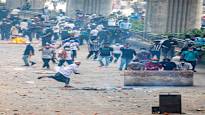Students have demanded an end to the quota system for public sector jobs, which has been criticized for favoring groups that support the country’s government.
18.7. 18:32•Updated 18.7. 19:12
In Bangladesh, more than 30 people have died in the student protests of the last few days, according to the news agency AFP, which collected information from several hospitals.
On Thursday, during which violence was seen in several cities around the country, 25 people died according to AFP calculations.
In addition, almost a thousand people had received hospital treatment for injuries they had received in clashes with the police.
According to AFP data, at least two thirds of the deaths have been caused by the weapons used by the police.
Students have demanded an end to the country’s quota system for public sector jobs in the protests that have been ongoing since the beginning of the month. The quota system has been criticized for favoring groups that support the country’s government.
The country’s Prime Minister Sheikh Hasina’s government has ordered schools and universities to close indefinitely due to the protests.
The riot police were driven to the delivery building
Hundreds of protesters chased riot police who fired rubber bullets at them into the editorial building of the country’s state broadcaster BTV.
The crowd set fire to one of the supply buildings and dozens of vehicles parked in the yard, a BTV official told AFP.
A BTV representative said several people were trapped, but another official who spoke to AFP said the building had been safely evacuated.
The protests are an expression of wider discontent
Bangladesh’s public sector job quota system reserves more than half of civil service posts for certain groups, including children of veterans of the country’s 1971 war of liberation against Pakistan.
Prime Minister Hasina has ruled the country since 2009. At the beginning of the year, Hasina won her fourth consecutive election in which there was no real challenger.
The protests have been seen as growing into a broader expression of dissatisfaction with Hasina’s autocratic rule.
